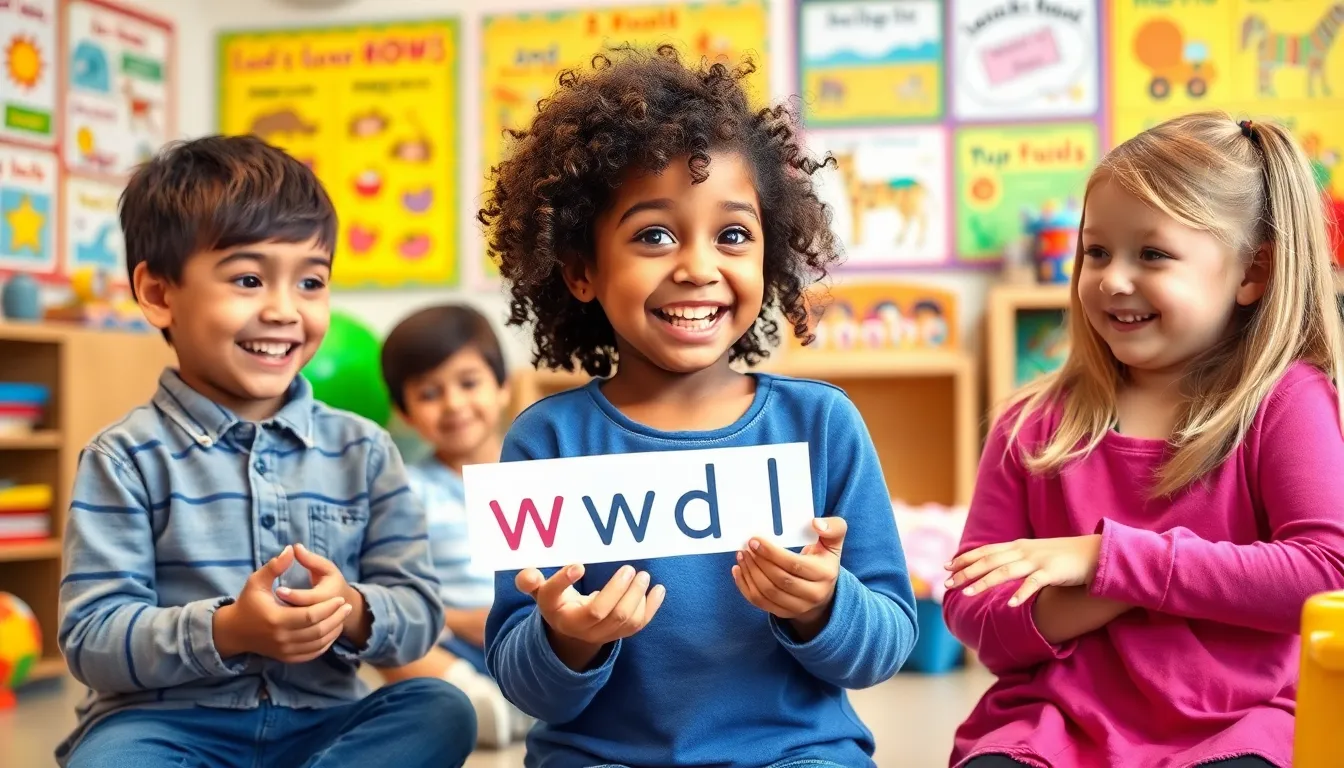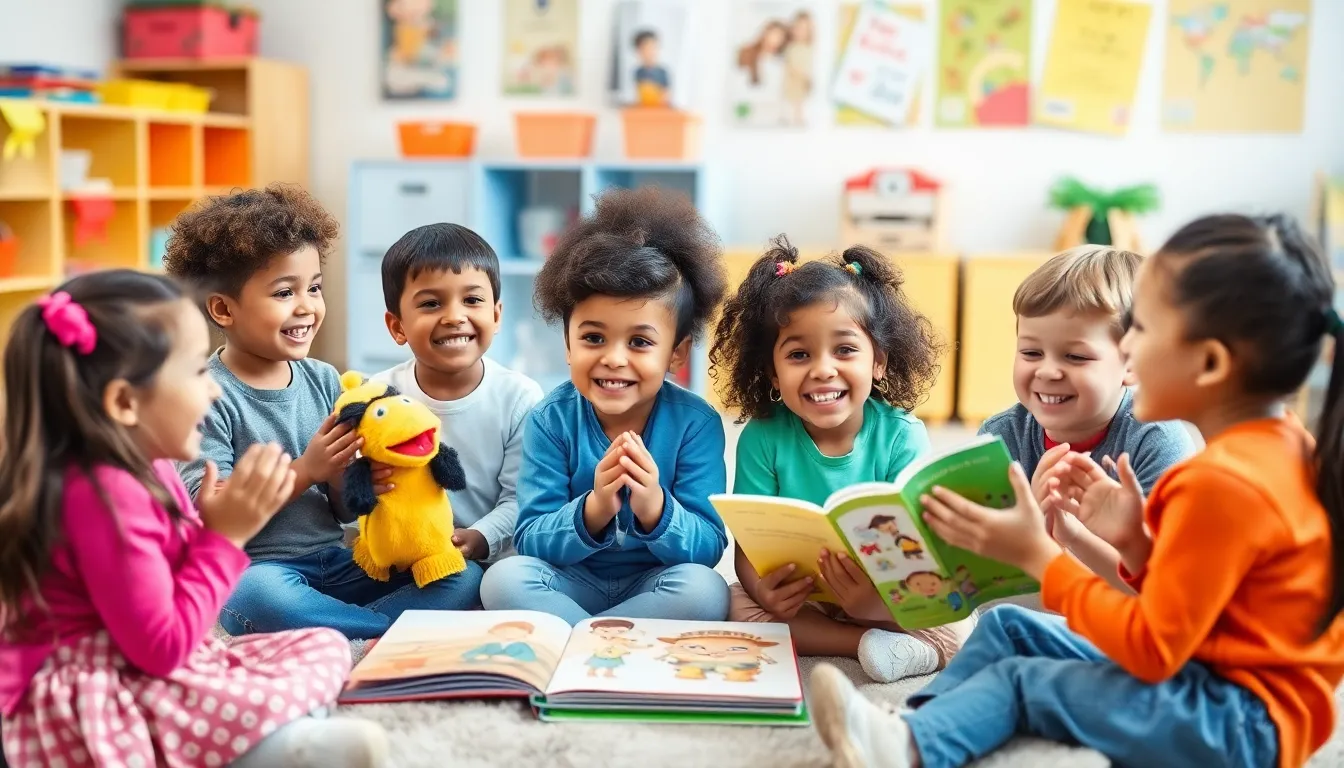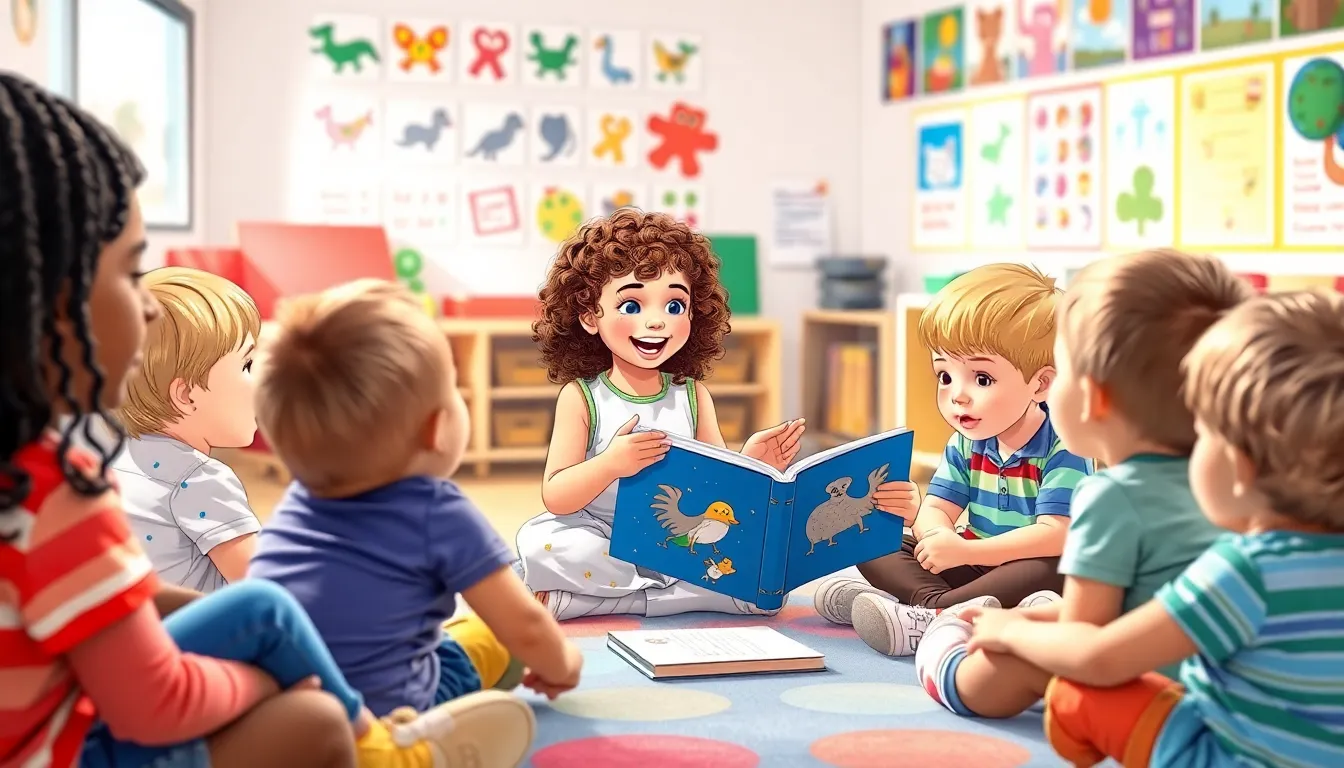Table of Contents
TogglePreschoolers are little bundles of energy and curiosity, constantly exploring the world around them. What better way to harness that enthusiasm than through language games? These playful activities not only entertain but also ignite a love for words and communication. Imagine a room full of giggles as kids dive into fun-filled games that boost their vocabulary and spark creativity.
Importance Of Language Games For Preschoolers
Language games play a crucial role in preschoolers’ development. These activities enhance communication skills and promote overall growth.
Cognitive Development
Cognitive development significantly benefits from language games. Engaging in word-related activities enhances kids’ problem-solving abilities, critical thinking, and memory retention. Vocabulary expands as children encounter new words through play. Games that involve rhymes and rhythms stimulate auditory skills, improving phonetic awareness. Improvisation-based games encourage creativity and narrative skills. Structured activities, like following directions or word-based puzzles, promote logical reasoning. Active participation in these games nurtures essential cognitive skills vital for future learning.
Social Interaction
Social interaction flourishes through language games. Children discover the importance of taking turns and sharing ideas during group activities. Through play, they learn to communicate effectively, expressing thoughts and emotions clearly. Role-playing games foster empathy as kids step into different characters to understand various perspectives. Cooperative tasks encourage collaboration and teamwork, building important social skills. Interaction during these games helps with understanding nonverbal cues, enhancing overall communication. Engaging with peers in a playful context creates strong bonds, enriching their social experiences.
Types Of Language Games


Language games come in various forms, each targeting different skills while engaging preschoolers. These games promote communication, creativity, and social interaction.
Interactive Storytelling
Interactive storytelling captivates children by immersing them in narrative adventures. Participants contribute to the story, enhancing imagination. They take turns suggesting plot twists, which sparks creativity and critical thinking. Vocabulary builds as children learn new words related to their contributions. Incorporating props or visual aids can further bolster engagement and understanding.
Charades and Acting Games
Charades and acting games offer a dynamic approach to language development. Players act out words or phrases, prompting peers to guess what they represent. This activity strengthens non-verbal communication skills and encourages teamwork. Expressing emotions and ideas through gestures aids in vocabulary expansion and comprehension. As children observe and respond to their peers, they enhance social skills.
Rhyming and Song Games
Rhyming and song games energize language learning with a musical twist. Singing songs with repetitive phrases and rhymes reinforces phonemic awareness. Children practice pronunciation and rhythm, which boosts language retention. Adapting familiar tunes for new lyrics encourages creativity and excitement. Group singing fosters collaboration and strengthens social connections among preschoolers.
Benefits Of Language Games
Language games offer significant advantages for preschoolers by promoting various aspects of their development.
Language Acquisition
Language games expedite language acquisition by creating an interactive environment. Engaging with peers through storytelling and role play enables preschoolers to practice new words. Children learn syntax and grammar organically as they participate in these activities. The repetition of phrases and vocabulary in fun contexts aids retention and recall. Interactive play encourages exploration and experimentation with language. Role-playing different scenarios builds comprehension skills while making lessons enjoyable. Exposure to varied language use allows for deeper understanding and application of language rules.
Vocabulary Expansion
Vocabulary expansion thrives in playful settings. Games that include rhyming, songs, and storytelling introduce children to new words effectively. Frequent exposure to diverse vocabulary enhances recall and proper usage. Engagement in these language games encourages curiosity and a desire to learn more words. Collaborative activities like word association or picture-word matching reinforce new terms. As preschoolers interact with their peers, they share ideas and vocabulary, further enriching their language banks. Playful learning becomes a natural method to integrate new vocabulary seamlessly into conversation.
Enhanced Communication Skills
Enhanced communication skills develop through participation in language games. Activities such as charades teach non-verbal cues, fostering understanding beyond spoken words. Children learn to express emotions and ideas clearly through gestures and facial expressions. Taking turns and listening to others during group activities builds patience and respect for different perspectives. These games cultivate essential listening skills vital for effective communication. Preschoolers gain confidence as they articulate thoughts in a supportive environment. Improved clarity and expression result from regular practice, leading to better overall communication abilities.
How To Incorporate Language Games At Home
Incorporating language games at home enriches preschoolers’ communication skills through engaging play. Simple adjustments can create an immersive language environment.
Creating a Language-Rich Environment
Surrounding preschoolers with books fosters curiosity and encourages word exploration. Labeling household items helps children associate words with objects, strengthening vocabulary links. Interactive conversations enhance language processing, allowing kids to practice speaking and listening skills. Regularly reading aloud introduces new words and ideas, promoting imagination and comprehension. Offering diverse language experiences develops a broader understanding and appreciation of communication.
Suggested Activities and Resources
Utilizing games like “I Spy” sharpens vocabulary and observational skills while making learning fun. Storytelling can be more interactive by letting children add characters or plot twists, stimulating creativity and narrative structure. Singing simple songs or rhymes encourages phonemic awareness, making language learning enjoyable. Many online resources and apps, such as interactive e-books, provide engaging formats for vocabulary building and pronunciation practice. Crafting language-related activities ensures preschoolers remain excited and motivated throughout their language learning journey.
Language games are essential tools for preschoolers’ development. They not only make learning enjoyable but also cultivate essential communication skills that will benefit children throughout their lives. By engaging in these playful activities, kids enhance their vocabulary and creativity while developing critical thinking and problem-solving abilities.
Incorporating language games into daily routines can transform ordinary moments into enriching experiences. As preschoolers explore language through storytelling, acting, and music, they gain confidence in their ability to express themselves. This playful approach to learning fosters a lifelong love for language and communication, setting a strong foundation for future academic success.




